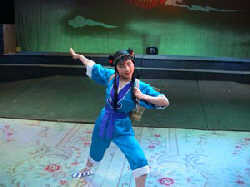 The development of Sichuan Opera is intrinsically linked to the natural conditions in Sichuan. The principal agricultural products cultivated in Sichuan's extraordinarily fertile soil include rice, tea and mulberry trees, whose leaves are used in the traditional industry of raising silkworms. Rustic songs originally sung by boatmen, tea-plantation and rice-paddy workers developed into famous local folk songs, which, in a sense, can be regarded as the precursors of the province's great operatic tradition.
The development of Sichuan Opera is intrinsically linked to the natural conditions in Sichuan. The principal agricultural products cultivated in Sichuan's extraordinarily fertile soil include rice, tea and mulberry trees, whose leaves are used in the traditional industry of raising silkworms. Rustic songs originally sung by boatmen, tea-plantation and rice-paddy workers developed into famous local folk songs, which, in a sense, can be regarded as the precursors of the province's great operatic tradition.
 'Changing Faces'
'Changing Faces'
One of the most fascinating, artistic charms of Sichuan Opera is "face-changing", which is achieved by quickly tearing off, rubbing, or blowing away a mask to reveal another.
The performer prepares many special masks in advance made of gauze and elastic materials, such as sheep embryo membranes and rubber. After the masks are painted with different designs and assembled with a special transparent thread, they are pasted onto the performer's face.
The special masks for "changing faces" must be made to fit the performer's face to ensure that they are pasted as close as possible to the skin. Previously, the masks were discarded after a performance, but today they can be recycled with some minor repairs.
 The music of Sichuan Opera
The music of Sichuan Opera
Musically, Sichuan Opera combines five different sonic systems, namely,gao qiang hu qin, deng diao, tan xi and kun qu-- all of which were still represented by their own independent troupes respectively until the end of the Qing Dynasty(1644-1911).
